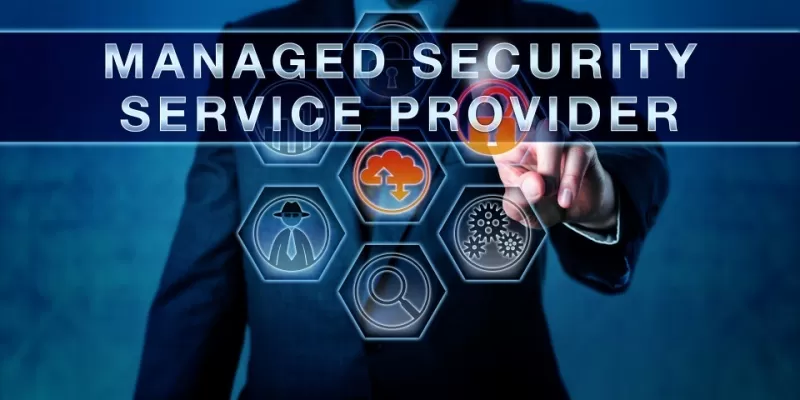Written By:
Scott McAuley
Scott is the IT Director of Texas Management Group, and has been in the IT industry for 25 years.
In a world where cyber threats are constantly evolving, businesses need robust security measures to stay protected. So, what is a MSSP?
A Managed Security Service Provider (MSSP) offers specialized services to safeguard your digital assets.
This article uncovers the top 10 services offered by MSSPs, detailing how they can fortify your organization’s defenses.
Ready to delve into the essential services that keep your data secure? Let’s explore the world of MSSPs and their unparalleled expertise.
Key Takeaways
- Managed Security Service Providers (MSSPs) deliver specialized cybersecurity services, protecting businesses with expert solutions and 24/7 monitoring.
- MSSPs focus on cybersecurity with proactive measures, while MSPs handle general IT support and infrastructure management.
- Consider expertise, services, staff quality, security posture, and budget when choosing an MSSP to meet your organization’s needs.
- MSSPs provide round-the-clock protection, specialist expertise, cost-efficiency, and compliance support, enhancing your organization’s security and operational efficiency.
- Assess MSSP experience, read customer reviews, review SLAs, compare costs, and request a Proof of Concept before deciding.
Table of Contents
What is a MSSP?

A Managed Security Service Provider (MSSP) is a specialized third-party cybersecurity firm that delivers comprehensive security solutions to businesses.
MSSPs provide cost-effective, efficient, and expert cybersecurity services, allowing organizations to enhance their security posture while focusing on their core activities.
These providers are adept at monitoring, managing, and defending against a wide array of cyber threats.
MSSPs operate from high-availability Security Operation Centers (SOCs), ensuring continuous protection against cyber threats.
By partnering with an MSSP, businesses can alleviate the need for an extensive in-house security team, as the MSSP takes on the responsibilities of recruiting, training, and retaining cybersecurity experts.
The concept of MSSPs emerged in the late 1990s when Internet Service Providers (ISPs) began offering managed firewall solutions. Over time, the scope of services provided by MSSPs has significantly expanded.
What’s the Difference Between MSP and MSSP?
Managed Service Providers (MSPs) and Managed Security Service Providers (MSSPs) both offer outsourced services to businesses, but they differ significantly in their focus and the support they provide.
Understanding these differences is crucial for organizations looking to enhance their IT and cybersecurity strategies.
Managed Service Providers (MSPs)
MSPs provide a broad range of IT services, focusing on general IT support and infrastructure management. Their primary goal is to ensure smooth day-to-day operations and to optimize IT performance.
Managed Security Service Providers (MSSPs)
MSSPs specialize in cybersecurity services, offering a range of solutions designed to protect organizations from cyber threats. Their primary focus is on proactive security measures and rapid incident response.
Key Differences
| Characteristic | MSP | MSSP |
|---|---|---|
| Primary Focus | General IT support and infrastructure management | Specialized cybersecurity services |
| Operations Center | Network Operations Center (NOC) | Security Operations Center (SOC) |
| Staff Expertise | Broad IT knowledge | Deep cybersecurity expertise |
| Service Offerings | Network management, software updates, technical troubleshooting, cloud services, IT administration | Managed firewall, MDR, security event monitoring, intrusion detection/prevention, incident response, compliance consulting, vulnerability assessments |
For many businesses, choosing between an MSP and an MSSP is not an either-or decision.
Organizations often use both providers to achieve comprehensive IT support and cybersecurity, optimizing their technology investments and ensuring robust protection against threats.
5 Key Areas to Consider When Evaluating an MSSP
Choosing a Managed Security Service Provider (MSSP) to protect your digital assets requires careful consideration.
It’s essential to evaluate several key factors to ensure the MSSP meets your security needs, budget, and long-term goals.
1. Expertise
Assessing an MSSP’s cybersecurity expertise is crucial. A top-tier MSSP should have a team of skilled security specialists. They must understand the threat landscape, vulnerabilities, and the latest security technologies.
2. Services
The range and quality of services an MSSP offers are critical. Look for a comprehensive suite that includes 24/7 monitoring, incident response, vulnerability management, and compliance support. Industry data shows 90% of organizations choose MSSPs for their data protection expertise.
3. Staff
The quality and availability of an MSSP’s staff are vital. A reliable MSSP should have a dedicated team of in-house experts ready to monitor and respond to threats 24/7.
Eighty percent of organizations prioritize the qualifications of the engineers and staff when choosing an MSSP, highlighting the importance of a skilled and responsive team.
4. Security
Assessing an MSSP’s security posture is crucial. The provider should have strong security measures to protect their systems and client data.
Using secure cloud environments for data storage can reduce data breaches by 30% compared to providers without such protocols.
5. Budget
While MSSPs offer cost-effective security solutions, it’s vital to find one that fits your budget. Pricing structures vary, so evaluate the value of each service to ensure you’re getting the necessary protection at a reasonable cost.
10 MSSP Services
Managed Security Service Providers (MSSPs) offer a comprehensive suite of services designed to enhance your organization’s cybersecurity posture.
By partnering with an MSSP, you gain access to a team of experts committed to safeguarding your digital assets.
Here are ten key MSSP services that can significantly bolster your security strategy:
| MSSP Service | Description |
|---|---|
| Risk Assessments and Gap Analysis | Identifying vulnerabilities and areas needing improvement |
| Policy Development and Risk Management | Creating security policies and implementing risk management strategies |
| Solution Scoping | Tailoring security infrastructure to meet specific needs |
| Solution/Tool Research and Requisition | Procuring advanced security products |
| Solution Implementation | Deploying and integrating security tools |
| Management of Security Systems | Continuous monitoring, incident response, and maintenance |
| Configuration Management | Ensuring optimal configuration of security settings |
| Security Updates | Managing deployment of security patches |
| Reporting, Auditing, and Compliance | Generating detailed reports on security status and compliance |
| Training and Education | Providing cybersecurity training and awareness programs for employees |
1. Risk Assessments and Gap Analysis
MSSPs conduct detailed risk assessments to identify vulnerabilities within your security framework.
Through gap analysis, they pinpoint areas requiring enhancement, allowing you to focus your resources and efforts effectively on critical security improvements.
2. Policy Development and Risk Management
MSSPs assist in creating robust security policies that align with your business goals and regulatory requirements.
They implement risk management strategies to mitigate potential threats and ensure compliance with industry standards, safeguarding your organization from various risks.
3. Solution Scoping
MSSPs collaborate with your organization to understand your specific security needs.
They identify and recommend the most suitable tools and technologies to tailor your security infrastructure, ensuring optimal protection and efficiency.
4. Solution/Tool Research and Requisition
Staying ahead in the ever-evolving threat landscape requires access to the latest security solutions.
MSSPs conduct thorough research and procure advanced security products, ensuring your organization is equipped with cutting-edge technology to defend against emerging threats.
5. Solution Implementation
Implementing security solutions can be complex and resource-intensive. MSSPs handle the deployment and integration of these tools, ensuring seamless incorporation into your existing systems.
Their expertise minimizes operational disruptions while maximizing the effectiveness of your security measures.
6. Management of Security Systems
MSSPs provide ongoing management of your security systems, including continuous monitoring, incident response, and regular maintenance.
By proactively monitoring your network and systems, they detect and respond to threats in real-time, minimizing the impact of security incidents.
7. Configuration Management
Proper configuration of security settings is essential for maintaining a strong security posture. MSSPs manage your system configurations, ensuring they are optimized and aligned with best practices.
Regular reviews and updates prevent misconfigurations that could lead to vulnerabilities.
8. Security Updates
Keeping your systems and software updated with the latest security patches is critical for protection against known vulnerabilities.
MSSPs manage the deployment of security updates and patch management processes, ensuring your systems are always protected against the latest threats.
9. Reporting, Auditing, and Compliance
MSSPs offer comprehensive reporting and auditing services to meet regulatory requirements and demonstrate due diligence.
They generate detailed reports on security incidents, vulnerabilities, and compliance status, enabling informed decision-making and satisfying auditing requirements.
10. Training and Education
Educating employees on security awareness and best practices is vital for maintaining a strong security culture.
MSSPs provide training and education programs to inform staff about cybersecurity and their role in protecting assets. Regular training sessions keep employees vigilant against potential threats.
12 Security Technologies Managed and Deployed by MSSPs
Managed Security Service Providers (MSSPs) play a crucial role in modern cybersecurity strategies. They offer specialized services that enhance an organization’s security posture by managing and deploying various security technologies.
Here are the 12 essential security technologies managed and deployed by MSSPs:
| Technology | Description |
|---|---|
| Intrusion Prevention Systems (IPS) | Detect and block network threats in real time. |
| Web Content Filtering | Block harmful websites and enforce safe browsing. |
| Identity Access Management (IAM) | Control access to sensitive systems and secure remote/cloud access. |
| Privileged Access Management (PAM) | Monitor and manage privileged accounts to reduce insider threats. |
| Vulnerability Scanning | Regular scans to identify and address security weaknesses. |
| Patch Management | Automate software updates to reduce risks from unpatched vulnerabilities. |
| Anti-virus (AV) | Provide real-time malware protection using advanced detection methods. |
| Anti-spam | Filter out phishing and unsolicited emails for safer communication. |
| Firewalls (UTMs, NGFWs) | Control network traffic and block threats with advanced security features. |
| VPN | Secure remote access with encrypted connections. |
| Data Loss Prevention (DLP) | Prevent unauthorized data transfers and protect sensitive info. |
| Threat Intelligence | Stay ahead of emerging threats with real-time intelligence. |
1. Intrusion Prevention Systems (IPS)
MSSPs manage IPS to detect and block threats in real time, using machine learning to adapt and protect networks from new attacks.
2. Web Content Filtering
MSSPs deploy web filters to block harmful websites and enforce internet usage policies, protecting users from phishing and malware.
3. Identity Access Management (IAM)
IAM controls access to sensitive systems, and MSSPs manage it to secure user authentication for remote and cloud access.
4. Privileged Access Management (PAM)
MSSPs control privileged accounts, monitoring and limiting access to critical systems, reducing insider and unauthorized threats.
5. Vulnerability Scanning
MSSPs perform regular scans to detect security weaknesses, helping organizations fix vulnerabilities before they’re exploited.
6. Patch Management
MSSPs automate the patching process to keep software updated, minimizing risks of breaches from unpatched vulnerabilities.
7. Anti-virus (AV)
MSSPs manage AV software for real-time protection against viruses and malware, using behavioral analysis to detect new threats.
8. Anti-spam
MSSPs deploy anti-spam solutions to filter out phishing and unsolicited emails, ensuring safe email communication.
9. Firewalls (UTMs, NGFWs, etc.)
MSSPs manage firewalls to control network traffic and block threats, with advanced features like deep packet inspection and application awareness.
10. VPN
MSSPs manage VPNs to provide secure, encrypted connections for remote users, protecting data transmitted over public networks.
11. Data Loss Prevention (DLP)
MSSPs deploy DLP solutions to prevent unauthorized data transfers and protect sensitive information from breaches.
12. Threat Intelligence
MSSPs use threat intelligence to stay ahead of emerging threats, improving security defenses and enabling proactive responses.
7 Benefits of an MSSP
Managed Security Service Providers (MSSPs) play a crucial role in modern cybersecurity strategies, offering comprehensive solutions that enhance protection and operational efficiency for organizations.
Here are seven key benefits of partnering with an MSSP:
| Benefit | Description |
|---|---|
| Filling Vacant Roles | Immediate access to skilled cybersecurity professionals to fill critical security positions. |
| Access to Specialist Expertise | Deep knowledge across diverse cybersecurity domains, enhancing security capabilities. |
| Round-the-Clock Protection | Continuous monitoring and rapid response to threats, ensuring 24/7 security coverage. |
| Increased Security Maturity | Implementation of industry best practices to elevate overall security resilience. |
| Solution Configuration and Management | Efficient deployment and management of security technologies, optimizing operational efficiency. |
| Lower Total Cost of Ownership | Cost-effective alternative to maintaining an in-house security team, reducing overall expenses. |
| Compliance Support | Expertise in regulatory compliance, ensuring adherence to legal and industry standards. |
1. Filling Vacant Roles
Cybersecurity talent is in high demand but short supply. MSSPs provide immediate access to a team of skilled professionals who can fill critical security roles.
2. Access to Specialist Expertise
MSSPs specialize in cybersecurity, offering deep expertise across a wide range of security technologies and practices. This includes threat detection and response, vulnerability management, and regulatory compliance.
3. Round-the-Clock Protection
Cyber threats can arise at any time. MSSPs offer continuous monitoring and response capabilities, providing organizations with 24/7 protection against evolving threats.
4. Increased Security Maturity
Partnering with an MSSP can elevate an organization’s security posture. MSSPs employ industry best practices and frameworks (such as NIST or ISO standards) to assess, plan, and implement robust security measures.
5. Solution Configuration and Management
Deploying and managing security solutions can be complex and resource-intensive. MSSPs streamline this process by handling the configuration, deployment, and ongoing management of security technologies.
6. Lower Total Cost of Ownership
Maintaining an in-house security operation requires significant investments in technology, training, and personnel. MSSPs offer cost-effective alternatives by providing scalable services tailored to organizational needs.
7. Compliance Support
Meeting regulatory requirements and industry standards is critical for organizations across various sectors.
MSSPs specialize in compliance management, helping organizations navigate complex regulatory landscapes and maintain adherence to relevant standards.
4 Challenges and Considerations of an MSSP
Managed Security Service Providers (MSSPs) offer a range of security services designed to protect businesses from cyber threats.
However, engaging an MSSP involves several challenges and considerations that organizations must address to ensure a successful partnership.
Here are four key challenges and their potential solutions:\
1. Finding the Right MSSP
Challenge:
Selecting an MSSP that aligns with your organization’s security needs, compliance requirements, and business objectives can be daunting.
The market is saturated with providers, each offering different levels of expertise, services, and technologies.
Solution:
Conduct a thorough vetting process, including RFPs (Requests for Proposals), interviews, and reference checks. Leverage industry reports and analyst evaluations to narrow down potential partners.
Additionally, consider engaging a consultant to assist with the selection process if internal expertise is lacking.
2. Integration with Existing Systems
Challenge:
Seamlessly integrating an MSSP’s services with your existing IT infrastructure and security systems can be complex. Incompatibilities can lead to gaps in coverage, increased vulnerability, and operational disruptions.
Solution:
Engage in detailed technical discussions during the selection process to identify potential integration issues early. Opt for MSSPs that offer flexible, customizable solutions.
Additionally, plan for a phased implementation approach, starting with less critical systems to identify and resolve integration challenges before full deployment.
3. Cost
Challenge:
The cost of MSSP services can vary significantly, and managing these costs while ensuring comprehensive security coverage is a critical concern for organizations.
Solution:
Create a detailed budget that accounts for all potential costs associated with MSSP services. Negotiate service level agreements (SLAs) that specify performance expectations and cost structures.
Consider engaging in a pilot program to evaluate the MSSP’s value before committing to a long-term contract.
4. Trust and Control
Challenge:
Outsourcing critical security functions to an MSSP requires a high level of trust. Organizations may have concerns about relinquishing control over sensitive data and security operations.
Solution:
Establish a collaborative partnership with the MSSP, fostering open communication and transparency. Implement robust SLAs that outline roles, responsibilities, and expectations.
Regularly review and audit the MSSP’s performance to ensure alignment with your organization’s security objectives and compliance requirements.
5 Tips to Help You Choose the Right MSSP
With so many Managed Security Service Providers (MSSPs) out there, finding the right one can feel overwhelming.
Here are five key tips to help you choose wisely:
- Check Their Experience and Expertise
Look for MSSPs with a proven track record in your industry. Ask about their experience with similar security challenges and their knowledge of the latest cybersecurity trends. - Read Customer Reviews
Customer testimonials give you insight into how well the MSSP performs. Look for feedback on their responsiveness, expertise, and customer satisfaction to gauge their reliability. - Review the SLA
A strong Service Level Agreement (SLA) is crucial. Make sure it clearly outlines services, response times, and performance guarantees that align with your needs. - Consider Your Budget
While cost isn’t everything, it’s important. Compare the pricing of different MSSPs and the value they provide. A good MSSP can save you money by preventing costly breaches. - Ask for a Proof of Concept (PoC)
Request a PoC to see how the MSSP works in real time. This will help you evaluate their threat detection, response, and communication skills before committing.
Conclusion
In a constantly evolving cyber threat landscape, MSSPs are indispensable for robust digital security.
Managed Security Service Providers offer top-tier services like threat monitoring, incident response, and vulnerability scanning to fortify your organization’s defenses.
Partnering with an MSSP not only enhances your security posture but also allows you to focus on core business activities while experts manage your cybersecurity.
Consider integrating MSSP services into your security strategy to ensure comprehensive protection.
Ready to secure your digital assets? Reach out to a trusted MSSP today and safeguard your organization against cyber threats.
Ready to Take Control of Your Cybersecurity With a reliable MSSP?
Discover more about our network management services and how they can enhance your security strategy.
Plus, stay up-to-date with the latest in tech by exploring our blogs for expert insights.
FAQ
What is the Difference Between MSP and MSSP?
An MSP (Managed Service Provider) offers general IT services, while an MSSP (Managed Security Service Provider) specializes in cybersecurity services.
What are the Two Main Benefits of Using an MSSP?
The two main benefits of using an MSSP are enhanced security expertise and 24/7 monitoring and incident response.
What is the Difference Between MSSP and MDR?
An MSSP provides comprehensive security services, including monitoring and management, while MDR (Managed Detection and Response) focuses specifically on threat detection and incident response.
What is the Difference Between MSSP and SOC?
An MSSP is a service provider offering outsourced security management, while a SOC (Security Operations Center) is a dedicated team or facility for monitoring and managing security within an organization.






